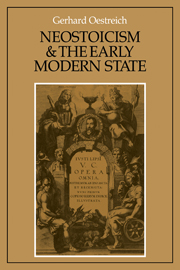Book contents
- Frontmatter
- Contents
- Foreword
- Introduction
- PART I JUSTUS LIPSIUS AND THE NETHERLANDS MOVEMENT
- 1 Constantia in publicis malis
- 2 The political intent in Neostoic philosophy
- 3 The main political work of Lipsius
- 4 Political Neostoicism
- 5 The military renascence
- 6 The European echo
- 7 The Netherlands movement in Brandenburg-Prussia
- PART II THE CONSTITUTIONAL DEVELOPMENT OF THE EARLY MODERN STATE
- Index
3 - The main political work of Lipsius
Published online by Cambridge University Press: 04 May 2010
- Frontmatter
- Contents
- Foreword
- Introduction
- PART I JUSTUS LIPSIUS AND THE NETHERLANDS MOVEMENT
- 1 Constantia in publicis malis
- 2 The political intent in Neostoic philosophy
- 3 The main political work of Lipsius
- 4 Political Neostoicism
- 5 The military renascence
- 6 The European echo
- 7 The Netherlands movement in Brandenburg-Prussia
- PART II THE CONSTITUTIONAL DEVELOPMENT OF THE EARLY MODERN STATE
- Index
Summary
Lipsius' Politicorum sive civilis doctrinae libri sex appeared in Leiden in 1589. It followed more than fifteen years of conscious or unconscious preparation, during which Lipsius had occupied himself with Tacitus, the greatest of the Roman historians. His celebrated Tacitus edition of 1574 is not just a work of brilliant philology and textual criticism: it also exhibits the editor's concern with practical politics, the linking of politics and history. In his introduction Lipsius stresses the modernity of the Roman and praises his account of history as a fund of experience for tackling present problems. This propensity for the practical exploitation of history comes out even more strongly in the Tacitus commentary of 1581. Rome and things Roman, in particular the period of the Principate, were again and again invoked by Lipsius as a model of the present.
The seventeenth century has been called, not without reason, the ‘Neo-Roman period’. For Lipsius and his contemporaries, the Roman past prompted a wealth of observations which were now to be used in the service of state administration and the moulding of public life. In the dedication to his commentary on Tacitus, Lipsius advises the Dutch ruling class to draw upon history and experience as the basis of a science of politics. He himself, as a much-consulted teacher, a much-read author and an authoritative editor of classical writers, always directed his activity to practical ends – and these he achieved, for in both the Constantia and the Politics Lipsius correctly read the signs of the times.
- Type
- Chapter
- Information
- Neostoicism and the Early Modern State , pp. 39 - 56Publisher: Cambridge University PressPrint publication year: 1982



